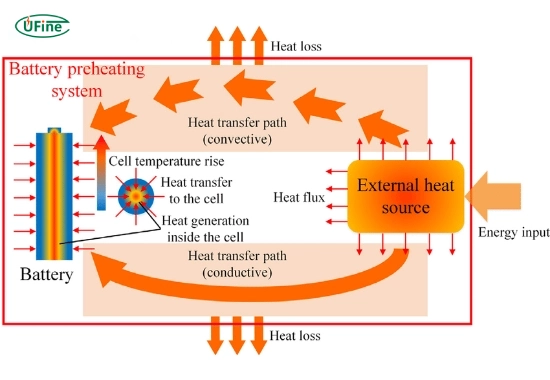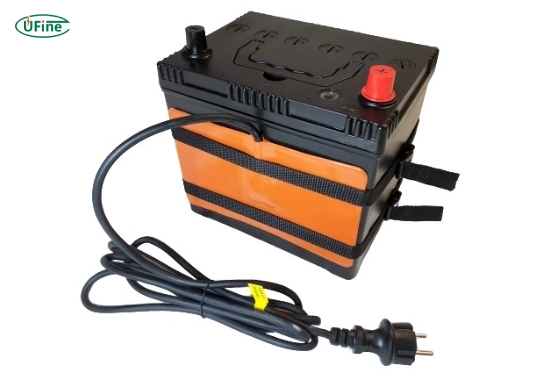Battery heaters are essential devices that significantly enhance battery performance in low temperatures. As temperatures drop, batteries’ efficiency and capacity can diminish, leading to various user challenges, particularly in electric vehicles and renewable energy systems. This article delves into how battery heaters work, their benefits, and their applications, providing a comprehensive understanding of their importance in maintaining optimal battery performance during cold weather.
Part 1. What are battery heaters?
Battery heaters are specialized devices designed to maintain or increase the temperature of batteries when exposed to cold environments. They are crucial for various battery types, including lithium-ion, lead-acid, and nickel-metal hydride. By ensuring that batteries operate within their optimal temperature range, battery heaters help prevent performance degradation and extend battery life.
How Do Battery Heaters Work?
Battery heaters typically use one of two methods to provide warmth:
- Resistance Heating: This method passes an electric current through a resistive material that generates heat. The heat is then transferred to the battery.
- Heat Pads or Blankets: These insulated materials wrap around the battery and contain heating elements. They provide uniform heat distribution and are often used in electric vehicles.
Part 2. Why are battery heaters important in cold weather?
Cold weather can have detrimental effects on battery performance. Here are some key reasons why battery heaters are essential:
- Reduced Capacity: At low temperatures, batteries’ chemical reactions slow down, decreasing their available capacity. For instance, lithium-ion batteries can lose up to 30% of their capacity at temperatures below freezing.
- Increased Internal Resistance: Cold temperatures increase batteries’ internal resistance, making it harder for them to deliver power efficiently. This increased resistance can lead to significant drops in performance during critical moments.
- Slower Charging Rates: Batteries may take longer to charge in cold conditions, which can be inconvenient for users relying on quick turnaround times. For example, charging times can double or even triple in frigid temperatures.
Part 3. Benefits of using battery heaters
Utilizing battery heaters offers several advantages:
- Enhanced Performance: Battery heaters ensure that batteries deliver maximum power and efficiency by maintaining optimal temperatures. This is particularly important for electric vehicles that depend on consistent power output.
- Extended Lifespan: Keeping batteries warm can reduce wear and tear caused by low-temperature stress, prolonging their lifespan. Studies show that batteries can last up to 20% longer when kept at optimal temperatures.
- Improved Safety: Battery heaters can help prevent thermal runaway situations when batteries are subjected to extreme cold followed by rapid heating. This safety feature is crucial for preventing accidents and ensuring user safety.
Part 4. Types of battery heating solutions
There are various types of battery heating solutions available on the market:
- Integrated Heating Systems: Some electric vehicles have built-in battery heating systems that automatically activate when temperatures drop, optimizing performance without user intervention.
- Aftermarket Solutions: For those who wish to retrofit their existing systems, aftermarket battery heaters can be purchased and installed easily. These solutions often come with user-friendly installation guides.
- Smart Heating Solutions: These advanced systems use sensors to monitor battery temperature and adjust heating accordingly for optimal efficiency. Smart solutions can save energy by only activating when necessary.
Part 5. Applications of battery heaters
Battery heaters find applications across multiple sectors:
- Electric Vehicles (EVs): Maintaining battery temperature is crucial for performance and range during winter months. Many manufacturers now include these systems as standard features due to their importance.
- Renewable Energy Systems: Solar energy storage systems benefit from battery heaters to ensure efficient energy storage even in cold climates. This is vital for maximizing energy capture during winter when sunlight is limited.
- Aerospace and Defense: Reliable battery performance is critical for military equipment or aircraft in extreme conditions. Battery heaters ensure that these systems function optimally regardless of external temperatures.
Part 6. How to choose the right battery heater?
When selecting a battery heater, consider the following factors:
- Compatibility: Ensure that the heater is compatible with your specific type of battery. Different batteries have unique requirements regarding heating methods and temperature ranges.
- Power Source: Determine whether you need a plug-in heater or one that operates off the vehicle’s electrical system. This decision will impact installation complexity and portability.
- Temperature Range: Look for heaters to maintain optimal temperatures in your specific climate. Some models are designed for extreme cold environments, while others may suffice for milder conditions.
Part 7. Installation tips for battery heaters
Proper installation is key to maximizing the effectiveness of battery heaters:
- Follow Manufacturer Instructions: Always adhere to the guidelines provided by the manufacturer during installation to ensure safety and functionality.
- Positioning Matters: Place the heater where it can evenly distribute heat across the entire battery surface. Uneven heating can lead to hotspots that may damage the battery over time.
- Check Electrical Connections: Ensure all electrical connections are secure and insulated to prevent short circuits or overheating. Regular maintenance checks can help identify potential issues early.
Part 8. Common misconceptions about battery heaters
Several myths surround battery heaters that need clarification:
Myth: All Batteries Need Heaters in Winter
- While many batteries benefit from heating in cold weather, not all require it. Before investing in a heater, check your specific battery type for recommendations.
Myth: Battery Heaters Drain More Power Than They Save
- Although they consume power, the efficiency gains from using a heater often outweigh its energy consumption significantly—especially during peak usage times.
Part 9. FAQs
-
What temperature range do battery heaters maintain?
Battery heaters typically maintain temperatures between 0°C (32°F) and 20°C (68°F), depending on the specific model and application requirements. -
Can I use a regular heater instead of a battery heater?
No, regular heaters can generate excessive heat that may damage batteries. It’s crucial to use dedicated battery heating solutions designed specifically for this purpose. -
How long does it take for a battery heater to warm up a cold battery?
The time required varies depending on the heater’s power output and the battery’s initial temperature, but it generally ranges from 30 minutes to several hours. -
Are there any safety concerns with using battery heaters?
Battery heaters are safe; however, improper installation or malfunctioning units can pose risks such as overheating or electrical issues if not appropriately monitored. -
Do all electric vehicles come with built-in battery heaters?
Not all electric vehicles have built-in heating systems; some may require aftermarket solutions depending on their design and intended use in colder climates. Always check manufacturer specifications before purchasing additional equipment.
Related Tags:
More Articles

How to Choose the Best Floor Scrubber Battery for Commercial Cleaning?
Selecting the ideal floor scrubber battery ensures a long runtime, rapid charging, and minimal maintenance for efficient commercial cleaning operations.
Battery for Blower vs Battery for Leaf Vacuum: Which One Should You Choose?
Battery for blower vs leaf vacuum—learn the key differences in power, fit, and runtime to choose the right battery for your outdoor tool needs.
How to Choose the Right Battery for Blower?
Choosing the right blower battery? Consider voltage, capacity, chemistry & usage. This guide helps match the best battery for peak performance.
How to Choose the Best Insulated Battery Box for Lithium Batteries?
Choosing the Best Insulated Battery Box for Lithium Batteries? Discover key factors such as size, material, and safety for optimal protection and performance.
7 Critical Elements on a Lithium Battery Shipping Label
What must be on a lithium battery shipping label? Learn 7 key elements to ensure safety, legal compliance, and correct handling across all transport modes.





